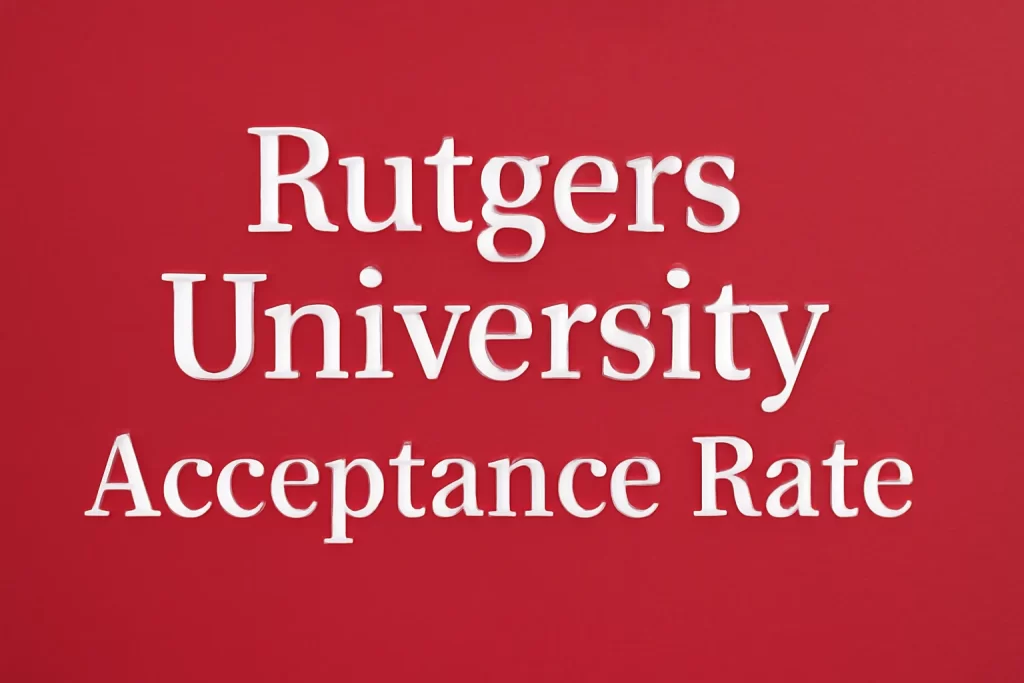Table of Contents
Rutgers University has seen a significant shift in its acceptance rate in recent years, with its selectivity increasing considerably.
Once a moderately selective institution, Rutgers now finds itself in a more competitive position with an acceptance rate of just 35.1% in the most recent admissions cycle.
This dramatic drop from a previous acceptance rate of 65-68% reflects a growing demand for admission to New Jersey’s flagship public research university.
This blog will take a closer look at recent trends, the factors contributing to this increased selectivity, and what prospective students can expect in the admissions process.
Recent Rutgers University Acceptance Rate Trends
In the most recent application year (2024), Rutgers University-New Brunswick saw an acceptance rate of 35.1%. With 77,000 applicants, only 27,000 students were offered admission, marking a significant decrease in acceptance rates compared to previous years.
Just one year earlier, in 2023, the acceptance rate stood at 66.3%, with 27,612 students admitted from 41,654 applicants. Looking further back to 2022, Rutgers accepted 68% of its applicants.
This shift in selectivity over a relatively short period shows that Rutgers is becoming an increasingly competitive institution, especially as the number of applicants has surged.
The application volume nearly doubled from 43,161 in 2022 to 77,000 in 2024, creating a highly competitive environment.
While the number of offers has stayed roughly the same at around 27,000, the increasing number of applicants has naturally made admission more difficult.
Read also: Can Canvas Quiz Tell If You Copy and Paste?
Admissions Criteria and Requirements Of Rutgers University
Rutgers University uses a holistic admissions process, which means that the university considers more than just test scores and GPA when making admissions decisions.
While academic metrics are important, the university also values other factors such as extracurricular involvement, leadership potential, and personal qualities.
Academic Performance:
- SAT scores: The middle 50% range for admitted students is between 1240 and 1470.
- ACT scores: Typically range from 26 to 32.
- GPA: Successful applicants generally have GPAs of 3.7 or higher. However, students with lower GPAs may still be considered if they demonstrate excellence in other areas.
Test-Optional Policy:
Rutgers follows a test-optional policy, which allows applicants to decide whether or not to submit their SAT or ACT scores.
This reflects the understanding that standardized test scores are just one aspect of an applicant’s academic ability.
In addition to strong academic credentials, Rutgers places a high value on extracurricular activities and leadership roles.
Whether it’s community service, sports, the arts, or other endeavors, students who demonstrate a commitment to meaningful activities outside of the classroom have a competitive edge in the admissions process.
Personal statements and essays also play an essential role in helping the admissions team understand each applicant’s unique perspective, experiences, and goals.
Campus-Specific Acceptance Rates
Rutgers University operates as a multi-campus system with three main campuses: New Brunswick, Newark, and Camden. Each campus has its own distinct admissions landscape.
- New Brunswick:
The New Brunswick campus is the most competitive and selective of the three. In 2024, it had an acceptance rate of 35.1%, the lowest of all Rutgers campuses. This campus attracts the largest number of applicants and enrolls students with the strongest academic profiles. Many of Rutgers’ most competitive programs and research opportunities are housed here. - Newark:
While Newark’s specific acceptance rate is not readily available, the campus generally admits a larger percentage of applicants than New Brunswick. The academic profile of students admitted to Newark is somewhat less selective, though it still offers rigorous academic programs. - Camden:
Camden has the highest acceptance rate among the three campuses, reflecting its more regional student population and smaller size. It is the smallest of the main Rutgers campuses and generally admits more students from the surrounding area.
Application Pathways and Outcomes
Rutgers offers two main application pathways: Early Action (EA) and Regular Decision (RD). For the 2024 application cycle, both pathways had the same acceptance rate of 35.1%.
However, the number of applicants in each group was different. 30,800 students applied through Early Action, and 10,800 of them were admitted.
In contrast, 46,200 students applied through Regular Decision, with 16,200 receiving offers.
Transfer Students:
The transfer acceptance rate at Rutgers is significantly higher than for first-year students. In 2024, Rutgers had a transfer acceptance rate of 55.2%, admitting 4,206 transfer students out of 7,619 applicants.
This higher acceptance rate reflects the university’s commitment to providing pathways for students transferring from other colleges.
Waitlist Data:
For the Class of 2028, Rutgers placed 2,000 students on the waitlist, with 600 of those ultimately receiving an offer of admission.
This resulted in a waitlist acceptance rate of 30%, which is relatively high compared to many other highly selective institutions.
Key Dates to Remember
Prospective students should keep track of important application deadlines:
- Early Action: Due by November 1, with decisions released in December.
- Regular Decision: Due by December 1, with decisions released in February.
These timelines allow students to plan their applications and, for Early Action applicants, to receive an admission decision earlier without any commitment to enroll.
Final Words
The significant decrease in Rutgers University’s acceptance rate—from 66-68% in 2022-2023 to 35.1% in 2024—has reshaped the admissions landscape, making it one of the most selective public universities in the country.
This shift can largely be attributed to a dramatic increase in applications, which has made competition for spots at the university fiercer than ever.
Prospective students aiming for admission to Rutgers should be prepared to meet or exceed competitive academic benchmarks, including high SAT or ACT scores, strong GPAs, and compelling extracurricular profiles.
The holistic admissions process means that applicants have an opportunity to showcase their strengths beyond academic performance, but the heightened selectivity emphasizes the importance of a well-rounded application.
Looking ahead, it is likely that Rutgers will continue to grow in popularity, and the competition for spots will only increase.
Students hoping to attend the university should be aware of the changing admissions environment and prepare accordingly for the application process.






